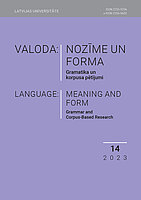Grieķu īpašvārdi un to atvasinājumi latīņu valodā („Latīņu–latviešu vārdnīcas” materiāls)
Greek proper names and their derivatives in Latin (“Latin–Latvian dictionary” material)
Author(s): Gita BērziņaSubject(s): Morphology, Historical Linguistics, Descriptive linguistics
Published by: Latvijas Universitātes Akadēmiskais apgāds
Keywords: Greek proper name; Latin; derivative; declension; rendering in Latvian; parallel variants;
Summary/Abstract: Analysis of the classical (Greek and Latin) language material serves not only to reveal general principles in language system and development processes, but also, in mutual comparative arrangement, to illuminate the essential features of other languages, including Latvian, in various aspects. Long contacts between Greek and Roman cultures and Greek and Latin languages have led to a significant and diverse influence of the Greek language on the Latin language and the related cultural, educational and scientific tradition. In Latin, there are extensive borrowings from Greek, connected with reception and reflection of mythological, literary, cultural, and other forms of tradition. The article, based on the work on the development of the new version of the “Latin–Latvian dictionary” (evaluation, editing and rendering of lexical material in Latvian), focuses on Greek proper nouns in Latin, their derivatives, and their rendering in Latvian. Many of the Greek proper nouns are entirely Latinized, while others are at least initially taken over and deliberately used in Latin texts in the Greek form, i.e., borrowed with Greek endings, and further adapted to a greater or lesser extent to the Latin declension system, often also developing parallel variants. Using Latin morphemes, in particular – suffixes and endings, generic nouns, adjectives, as well as verbs and adverbs, are derived from Greek personal and place names. Latin is characterized by a wide range of word-forming morphemes, including those with a synonymous meaning. It is used in many ways in the creation of derivatives of Greek origin in Latin, often creating and using parallel variants. As a result of the coexistence of Greek and Latin forms, as well as the use of a wide range of synonymous means of word formation, it is often a complicated task to select and reflect derivatives of Greek origin in the corpus of the “Latin–Latvian Dictionary”, as well as their rendering in Latvian.
Journal: Valoda: nozīme un forma
- Issue Year: 2023
- Issue No: 14
- Page Range: 7-21
- Page Count: 15
- Language: Latvian

